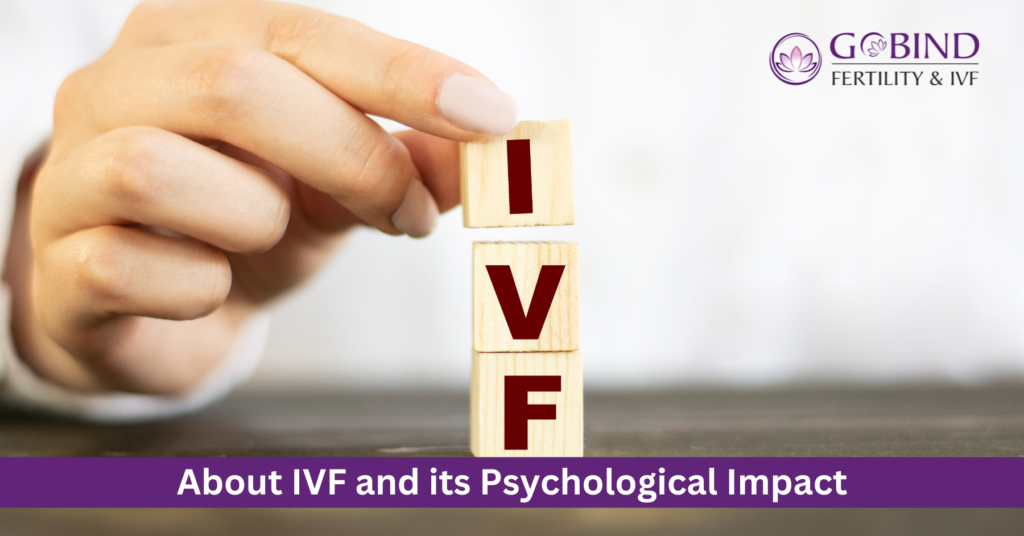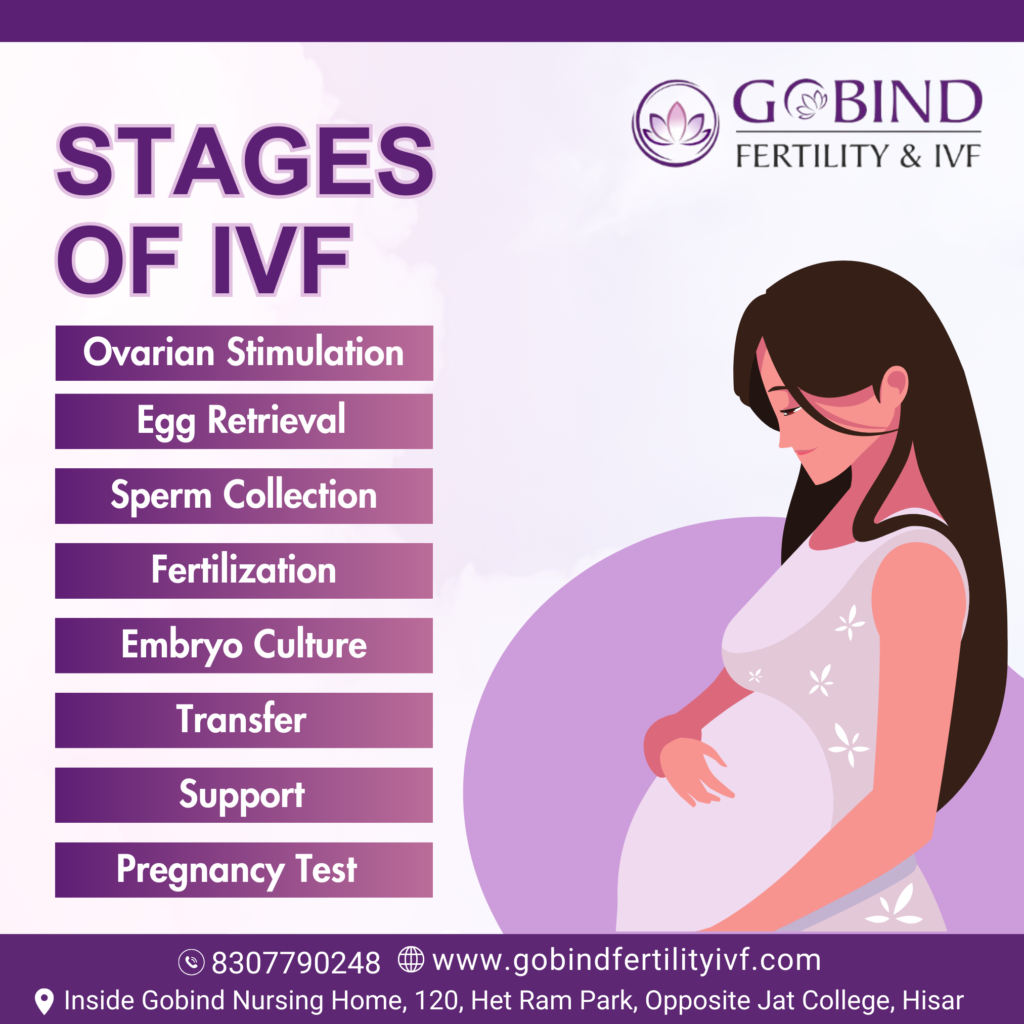About IVF and IVF’s psychological impact on individuals

In Vitro Fertilization (IVF) is a medical procedure used to help individuals or couples conceive a child when they face fertility challenges. IVF can be emotionally and physically demanding, involving a significant time commitment and financial cost. It offers a viable option for many facing infertility but also comes with challenges such as the risk of multiple pregnancies and the possibility of unsuccessful attempts. Psychological support and counseling are often recommended to help individuals and couples navigate the emotional complexities of the IVF journey.
What is IVF?
IVF is an ART process involving external fertilization of eggs with sperm, followed by embryo implantation in the uterus. Therefore, IVF is a complicated process where eggs are taken from a woman and mixed with sperm in a lab to make embryos. These embryos are then placed in the woman’s uterus. If an embryo sticks to the uterus, a woman becomes pregnant.
When IVF Treatment is done?
- Ovulation abnormalities
- when both tubes are blocked
- A genetic disorder
- Uterine fibroids
- IVF is offered to women whose eggs are very less
- Advanced age above 42.
- In grade 3 and grade 4 endometriosis
- In severe PCOS when other methods have failed.
- In premature ovarian failure.
- Male infertility -in severe male factor when sperm counts are much less
- When sperms are in the testes only then IVF done(TESA)
- The count of eggs is lower than usual in low AMH.
The Complete IVF Process
The first step in IVF involves taking fertility medications for several months to help your ovaries produce multiple mature eggs, a process known as ovulation induction. You may undergo regular ultrasounds or blood tests to monitor hormone levels and egg production.
Once enough mature eggs are produced, your doctor retrieves them with a minor surgical procedure called egg retrieval, performed at a clinic. This procedure is done under General Anaesthesia. Guided by an ultrasound, the doctor inserts a biopsy guide with an aspiration needle, through your vagina into the ovaries and follicular fluid is aspirated in the lab oocytes are recovered and kept in an incubator.
In the lab, your eggs are combined with sperm from your partner or a donor in a process called insemination. They are kept in a special container for fertilization. For sperm with lower motility, direct injection into the eggs may be done to aid fertilization. Lab technicians monitor the fertilized eggs as they divide into embryos.
About 3-5 days after retrieval, one or more embryos are transferred into your uterus via a thin tube through the cervix. Pregnancy occurs if any embryos attach to the uterine lining. Embryo transfer is typically painless and done at a clinic.
Rest for the day after the transfer and resume normal activities the next day. For the first 8-10 weeks, you may take progesterone pills or receive hormone shots to support embryo survival.
Side effects of IVF
- Ectopic Pregnancy: Ectopic pregnancy occurs when a fertilized egg implants outside the uterus, most commonly the fallopian tubes. This condition can be dangerous if not detected early, as it can lead to a rupture of the tube and severe internal bleeding.
- Nausea: Nausea is a horrible feeling in your stomach that makes you feel like you might throw up.
- Bloating: Bloating is a common issue that many people experience, causing discomfort and a feeling of fullness in the abdomen.
- Fatigue: Fatigue can be a common experience for individuals undergoing in vitro fertilization (IVF) treatment.
- Mood Swing: It is natural to experience a range of emotions during this time, including anxiety, sadness, and frustration.
- Allergic Reaction: When undergoing in vitro fertilization (IVF), some individuals may experience allergic reactions. These reactions can be triggered by various factors, such as the medications used during the process or materials in contact with the skin.
- Pelvic Infection: Pelvic infections can pose a significant challenge for individuals undergoing in vitro fertilization (IVF). These infections can result from various factors, including pre-existing conditions, surgical procedures, or bacterial contamination.
Psychological Impact of IVF
- Coping with Failure: As you may be aware, IVF cycles don’t always result in a successful pregnancy, and dealing with failed attempts can be tough. Each unsuccessful outcome can bring disappointment, grief, and a sense of loss. Coping with these setbacks and finding the strength to keep going can be challenging but is essential.
- Emotional imbalance of IVF: The emotional challenges of infertility and the decision to pursue IVF treatment are best understood by those who have experienced it. IVF involves various treatment levels, and its psychological effects differ for everyone. Couples may feel a range of emotions, including anger, despair, frustration, sadness, guilt, jealousy, excitement, hope, and happiness. Both partners often experience depression, anxiety, and stress before treatment begins, which can intensify after a failed IVF attempt. Even with a successful outcome, it’s common for couples to feel anxious or stressed throughout the pregnancy, hoping for a smooth birth. Understanding and managing these emotions is crucial for couples undergoing IVF.
- Stree & Anxiety: The IVF journey can be a tough road to travel. It’s filled with uncertainty, waiting periods, and lots of medical procedures. All of this can create a lot of pressure and strain to your mind. The strong desire to have a baby and all the ups and downs of each step in treatment can take a toll on everyone involved. The emotions can be like riding a rollercoaster, with highs and lows that can be hard to handle. It’s a journey, but many find it worth it in the end when they finally achieve their dream of starting a family.
- Impact on Relationships: The process of in vitro fertilization (IVF) can have a significant impact on relationships. The emotional and physical strain of undergoing fertility treatments, and the uncertainty of success Couples may experience feelings of frustration, disappointment, and stress as they navigate the ups and downs of IVF. Communication is key during this time, as open and honest conversations can help couples support each other and strengthen their bond. Partners need to be patient, understanding, and empathetic towards each other’s emotions and experiences throughout the IVF journey.
- Making Tough Calls: Going through IVF treatment can be tough because you’re faced with some big decisions. You might have to choose how many embryos to put in, think about trying more treatments, or figure out what to do with any embryos. These choices aren’t easy, and they can bring up all sorts of feelings and thoughts. It is normal to feel overwhelmed, sad, or even unsure about what to do. Just remember, it’s okay to take your time and talk to your doctor or a counsellor if you need help figuring things out.
- Depression: Failed IVF attempts can lead to feelings of sadness and depression. The emotional toll of repeated attempts can be profound.
How to maintain Psychological health after IVF
- Practice Self-Care: Engage in activities that you enjoy and that help you relax. Taking time for yourself can improve your overall well-being
- Professional counselling and psychological support are a vital part of a couple’s infertility journey. Our expert team at Gobind Fertility & IVF has professional counsellors who care for you and your partner’s feelings at every step of the process.
- Stay Positive: Focus on positive thoughts and outcomes. Keeping a positive mindset can help you cope with the emotional ups and downs of IVF.
- Take Care of Your Physical Health: Maintain a healthy diet, exercise regularly, and get enough sleep. Physical well-being can significantly impact your emotional health.
- Communicate Openly: Maintain open communication with your partner, friends, and family. Sharing your feelings and concerns can help you feel supported and understood.

